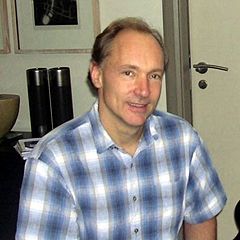Sir Tim Berners-Lee: The World Wide Web is 25 years old. Keep it free and open.
 Today the web is 25 years old. On March 12, 1989, I published a proposal to improve the exchange of information in the form of a “web of documents linked by cross-references.”
Today the web is 25 years old. On March 12, 1989, I published a proposal to improve the exchange of information in the form of a “web of documents linked by cross-references.”Although CERN , being primarily a physical laboratory, could not officially support such an abstract project, my boss, Mike Sandell, allowed me to devote some of my time to it. In 1990, I wrote the first browser and editor. In 1993, I was able to convince CERN to declare WWW technology that would be available to everyone and always, without any license fees.
This decision has allowed tens of thousands of people to start building a web together. Today, about 40% of the population of the planet use it. The Web has already brought trillions of dollars to the global economy, transformed education and medicine, and served to spread democracy throughout the world. And this is just the beginning.
Why was it possible to achieve this? The web and its underlying Internet are designed to be decentralized, non-hierarchical and fully open. The web can work with any type of information, on any device, with any software, in any language. No one needs to ask permission. Your creativity is limited only by your imagination.
')
Today is a holiday for us. But this is also an occasion to reflect, discuss and start to act. It's time to make key decisions about Internet governance and its development, and it is vital that we all take part in discussing the future of the World Wide Web. How can we be sure that the remaining 60% of humanity will quickly gain access to the Internet? How can we be sure that the web will support all languages and cultures, and not just some of the most common? How can we agree on the open standards of the coming Internet of Things? Will we allow someone to pack up and restrict our communication in the network or will we protect the magic of an open web and that power to speak, discover and create, which it gives? How can we build a system of checks and balances that ensures accountability to the community of those groups that can spy on the network? Such questions come to me. And you?
On the 25th anniversary of the web, I urge you to come up with and develop standards for the web of the future, and to make every country in the world accept the digital “Bill of Rights” that guarantees the distribution of free and open Internet for everyone. Join us at webat25.org , and on social networks using the # web25 hashtag.
Source: https://habr.com/ru/post/215575/
All Articles